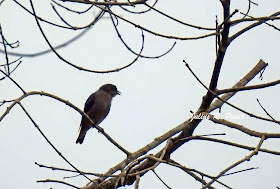This session was
supposed to be just like the usual, but Pete Simpson took us to a whole new
level of birding, this time bringing us extra higher than expected. I never
thought that would go down as a minor trekking in a dense forest of Eden Toril
but the output was extraordinary, perhaps the best in my entire birding life.
After about 4 months of not being able to do mountain trekking this one was a
refresher of sort and it was quite strenuous because I had to stay awake the
whole night before to attend to the wake of a photography mentor Tatay Rene
Lumawag before I left downtown very early in the morning on July 6 to catch up
with the Big Year team.
Pete and I left Matina
7-Eleven store by 5:00 in the morning and drove to Eden with Alden, Tonton and
Jong in the other car of Alden. After settling for a short briefing by Pete and
meeting with our guide Minoy we started the cold trekking first to the Army
detachment for a courtesy visit and to inform the personnel there of the
session that lasted more or less 10 hours. Coordination with law enforcement
agencies and local government units is crucial in any birding activity
especially if the site is a forested mountain range similar to that of Eden and
other mountainous sites in Mindanao. Along the way just minutes after the jump
off we stopped momentarily to witness Cryptic Flycatcher, a rare commodity
which is familiar in Eden and a lifer for Jong.
The first kilometers of
trekking are farmlands of community in Eden but the trail right off the
detachment was a sheer assault where we stood a little longer to observe
activities of Whiskered Flowerpecker, Philippine Pygmy Woodpecker, Cinnamon
Ibon, Torquise Flycatcher, Fire-breasted Flowerpecker and Buzzing Flowerpecker
in a partly-forested 800 masl site. From the record we had in this spot I could
even consider that was already a good session of two lifers for me and maybe
Tonton.
But there was even a
lot in store for us in the next sites. We could have just taken the much-easier
route but the flowerpeckers deserved some knee strains. Further up I asked
Minoy to target a water source because I did not bring one, this time realizing
(again) not to underestimate the mountain. In search for water brought us to a
little hut with some Mountain White Eyes and another solitary Buzzing
Flowerpecker before we could reach the trail of pine trees where Tonton and
Pete requested for trekking pole to increase hiking performance. The next stop
was at an abandoned purok near a water source where several good species were
seen like the Coppersmith Barbet, Philippine Bulbul, Tawny Grassbird and
Stripe-breasted Rhabdornis. The frustrating part here was the feather leftovers
of a butchered bird which I think was a Common Emerald Dove.
 |
| Mountain White Eye |
 |
| Buzzing Flowerpecker |
 |
| Stripe-breasted Rhabdornis |
Minoy told me we still
had to trek a little further to get inside the forest where we were greeted
with flock of the Mindanao endemic Black and Cinnamon Fantail, a familiar bird species
I saw every time I climb Mt. Apo. From this site (1,200 masl) also had us face
to face with the Yellow-bellied Whistler, another Philippine endemic dwelling
in the highlands of region XI. The trail we followed up was a track of water
pipe connecting its source to the community of barangay Eden. As our trekking
became more intense we observed different vegetation highlighted by giant palm
trees and some striking and vibrant flora and fauna. At a denser environment a
flock of Mountain White Eyes also settled in harmony with the Negros Leaf
Warbler, Mindanao White Eye, Sulphur-billed Nuthatch, Long-tailed Bush Warbler,
Bundok Flycatcher and the Mindanao endemic Grey-hooded Sunbird.
 |
| Black and Cinnamon Fantail |
 |
| Yellow-bellied Whistler |
 |
| Forest Snail |
 |
| Green-crested Lizard |
 |
| Green Phasmatodea |
 |
| Brown Phasmatodea |
 |
| Grey-hooded Sunbird |
 |
| Mindanao White Eye |
 |
| Negros Leaf Warbler |
By 11:00 AM we are
nearing the campsite were we estimated to take our lunch (although I only had
single bread, thanks to my good friends for giving me extra stuff, making that
lunch a bit of a buffet). Plenty of doves flying around the canopy were
unidentified, at least few of them. I spotted Philippine Cuckoo Dove and heard
some calls of Amethyst Brown Dove. Buff-spotted Flameback was seen as well, and
a couple of Mindanao Raquet-tails crisscrossing with Philippine Falconets. After a good lunch I took a nap in a log
covered by Minoy with fern leaves, to the delight of Tonton and Alden, even
before we heard a call of Crested Honey Buzzard which later on we saw behind
thick fogs. We expected presence of Apo Myna in the campsite but the bird never
appeared this time, leaving it one of the most elusive birds in my list other
than the Philippine Eagle.
It was almost 2:00 in
the afternoon when we left the campsite and when we got back to the purok there
was some threat of rain. A fog-covered trek down using a different trail to the
jump off was good enough but this time we never escaped from a moderate
downpour, thank you Pete for lending me your extra umbrella. Overall it was a
cool session with 50 great species of resident and endemic birds which,
according to Pete a consolation of sort because most of the birds in this time
of the year are in breeding mode.












































